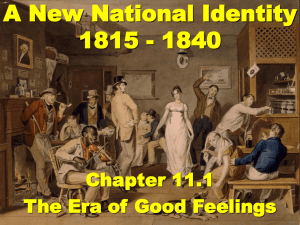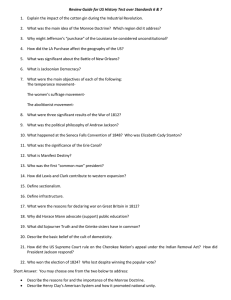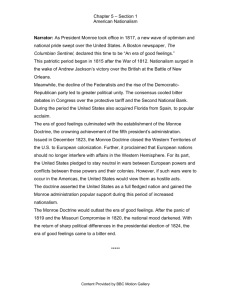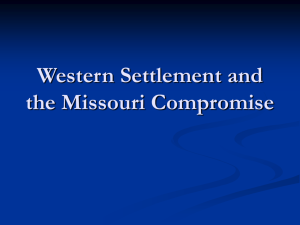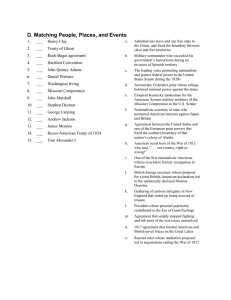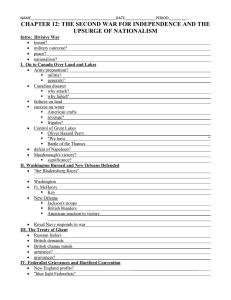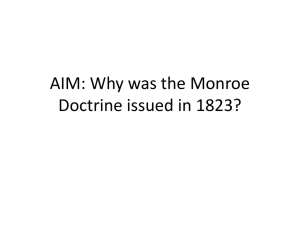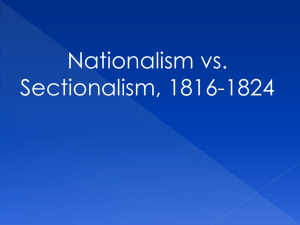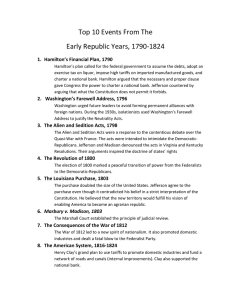Convention of 1818
advertisement
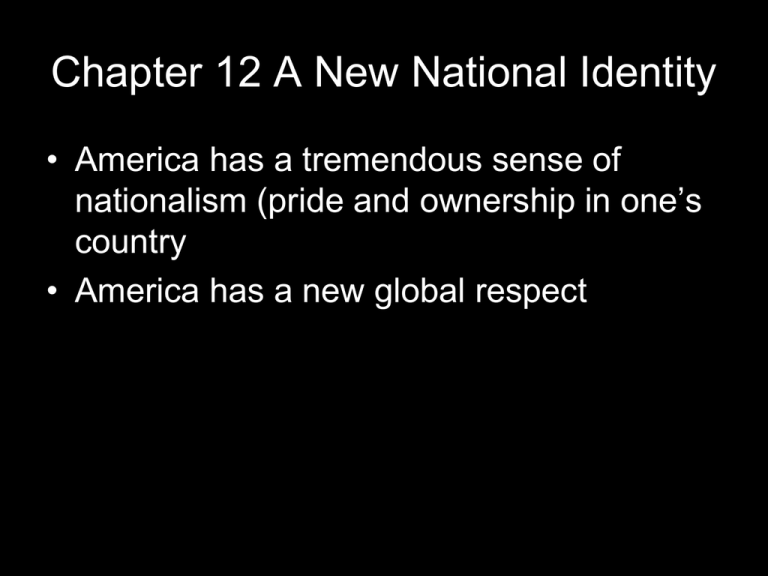
Chapter 12 A New National Identity • America has a tremendous sense of nationalism (pride and ownership in one’s country • America has a new global respect What should You Know? 1. What name is given to the period of peace and prosperity that followed the War of 1812? 2. Which agreement resolved fishing and naval rights on the Great Lakes? 3. Which agreement established the 49th parallel as the western border between Canada and the U.S.? Era of Good Feelings After the War of 1812, America entered a time of sustained peace, prosperity, and national pride. This time was known as the Era of Good Feelings. James Monroe, Republican, was elected President in 1816 and again in 1820. By 1820, Federalists have lost all power and do not even run a candidate for President. 1816 James Monroe 1820 Candidate Party Electoral Votes James Monroe Rep 183 Rufus King Fed 34 Electoral Votes Candidate Party James Monroe Rep 231 John Quincy Adams Rep 1 Era of Good Feelings Era of Good Feelings – Period following the War of 1812 in which America entered a time of sustained peace, prosperity, and national pride. James Monroe North America in 1818 Louisiana Territory Land Disputes Era of Good Feelings International Relations James Monroe faced several border disputes during his administration. Through diplomacy, peaceful (mostly) solutions were reached in each of these disagreements. Rush-Bagot Agreement 1817 – control of the Great Lakes Convention of 1818 – shared control of Oregon Country Adams-Onis Treaty 1819 – U.S. Gained Florida from Spain, gave up claim to Texas land Who controls the Great Lakes? • Britain and U.S. wanted to control the lakes and have fishing rights. • In 1817, the Rush-Bagot Agreement limited the number of navy ships on each lake. • Dispute resolved. Secretary of State Richard Rush Rush-Bagot Agreement -1817 Disputes in the Northwest • Britain and the U.S. both claimed parts of the Oregon Country. • They also disagreed about where the border should be between Canada and the U.S. in the Louisiana Territory. • The Convention of 1818 brought a peaceful solution to both issues: – The nations would share the claim to the Oregon Country. – The border between Canada and the U.S. was established at the 49th parallel. – U.S. gained fishing rights off of Newfoundland Convention of 1818 What do YOU need to know? 1. What name is given to the period of peace and prosperity that followed the War of 1812? A. B. C. D. E. Monroe Doctrine Missouri Compromise Convention of 1818 Era of Good Feelings Rush-Bagot Agreement What do YOU need to know? 2. Which agreement resolved fishing and naval rights on the Great Lakes? A. B. C. D. E. Monroe Doctrine Missouri Compromise Convention of 1818 Era of Good Feelings Rush-Bagot Agreement Listening Questions 3. Which agreement established the 49th parallel as the western border between Canada and the U.S.? A. B. C. D. E. Monroe Doctrine Missouri Compromise Convention of 1818 Era of Good Feelings Rush-Bagot Agreement What do YOU need to know? 4. Who stirred up international tensions by invading Florida in pursuit of Seminole Indians? 5. Through what agreement did the U.S. acquire Florida? 6. What was the intention of the Monroe Doctrine? Spanish Florida • American settlers wanted to move into Florida, which was owned by Spain. – Seminole Indians from Florida raided settlements then retreated into Florida – Runaway slaves were also protected by the Seminoles, which angered settlers in the U.S. • Along comes Andrew Jackson… Jackson’s Invasion • President Monroe sent Jackson to secure the border between Florida and the U.S. • Without approval from Monroe, Jackson decided to take his troops into Spanish Territory. – This is a clear invasion of Spanish land • Jackson fights Seminole Indians and Spanish troops that try to stop his invasion. – He takes over military forts and overthrows the Spanish governor of Florida. He does this WITHOUT THE PERMISSION OF THE GOVERNMENT Keep an eye on Jackson. The people think he’s great. • Britain and Spain are shocked and angry – but ANDREW JACKSON fails the American public lovesto see limits on his power and it. authority. Adams-Onis Treaty - 1819 • Losing power in the world, Spain realized that it would have a hard time holding on to Florida. – agreed to give Florida to the U.S. in exchange for the assumption of $5 million in claims against Spain. • The U.S. agreed to give up its claims of land along the border of Spanish Texas. John Quincy Adams and Louis de Onis What do YOU need to know? 1. What name is given to the period of peace and prosperity that followed the War of 1812? A. B. C. D. E. Monroe Doctrine Missouri Compromise Convention of 1818 Era of Good Feelings Rush-Bagot Agreement What do YOU need to know? 2. Which agreement resolved fishing and naval rights on the Great Lakes? A. B. C. D. E. Monroe Doctrine Missouri Compromise Convention of 1818 Era of Good Feelings Rush-Bagot Agreement What do YOU need to know? 3. Which agreement established the 49th parallel as the western border between Canada and the U.S.? A. B. C. D. E. Monroe Doctrine Missouri Compromise Convention of 1818 Era of Good Feelings Rush-Bagot Agreement Andrew Jackson and Florida • American settlers wanted to expand into Florida, which was owned by Spain. • Seminole Indians from Florida raided settlements in Southern U.S. then retreated into Florida • Runaway slaves were also protected by the Seminoles, which angered settlers in the U.S. • Andrew Jackson led U.S. troops into Florida and took over Spanish forts • This conflict is resolved with the Adams Onis Treaty, which gave Florida to the U.S. Adams-Onis Treaty - 1819 Latin American Independence • Spain was losing control of its empire in the Americas. • Simon Bolivar, born in Venezuela, led revolutionary forces and freed much of South America from Spanish rule. – He helped a continent win its freedom. • By 1823, most of the countries in Latin American had declared independence from Spain. Simon Bolivar – The Liberator The Monroe Doctrine • President Monroe worried that other European powers might try to take control of the new Latin American countries. • He sent a warning to all European countries. – Foreign powers should not create new colonies in the Americas nor interfere with Latin American countries. – Any such action would be seen as a hostile act. • This became known as the Monroe Doctrine. The Monroe Doctrine What do YOU need to know? 4. Who stirred up international tensions by invading Florida in pursuit of Seminole Indians? A. B. C. D. E. James Madison James Monroe Henry Clay Andrew Jackson Papa Smurf What do YOU need to know? 5. Through what agreement did the U.S. acquire Florida? A. B. C. D. E. Monroe Doctrine Missouri Compromise Convention of 1818 Adams-Onis Treaty Rush-Bagot Agreement What do YOU need to know? 6. What was the intention of the Monroe Doctrine? A. force Britain to stop attacking US ships B. stop impressment of US sailors C. prevent European nations from expanding into North and South America D. force Spain to cede Texas to the U.S. E. establish trade neutrality with France Domestic Issues • The charter for the First Bank of the United States expired in 1811. Congress let it expire without renewal. • The War of 1812 made leaders recognize the need for just such a bank. Oops! • In 1816, Congress and President Monroe chartered the Second Bank of the United States. Missouri • In 1819, there were 11 slave states and 11 free states in the United States. – With equal representation in the Senate, both sides knew they could prevent the other from forcing slavery legislation through Congress. • And then… • Settlers in the Missouri Territory asked to join the Union as a slave state in 1819. Missouri • Free states did not want another slave state in the Union. – Why not? • Unwilling to give up the balance of power, Free states refused to allow Missouri into the Union. • Henry Clay proposed a compromise. – Missouri would enter as a slave state – Maine would enter as a free state – Slavery would be prohibited north of 36° 30’ in the Louisiana Territory • This is known as the Missouri Compromise Missouri Compromise – Missouri would enter as a slave state – Maine would enter as a free state – Slavery would be prohibited north of 36° 30’ in the Louisiana Territory • Proposed by Henry Clay
